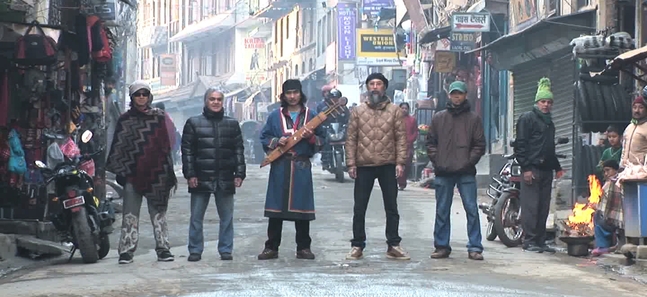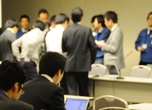Oki Dub Ainu Band: The interview
Ainu musician Oki speaks out against nukes and cigarettes

Posted: Tue Apr 12 2011
Born to a Japanese mother and Ainu father, Oki Kano has become one of the most visible representatives of Japan's indigenous people. Mind you, it took him a long time to get this far. The musician, who goes simply by the name Oki, only learnt of his ethnic heritage when he was at university, and it wasn't until his mid-thirties that he started to play the distinctive five-string Ainu instrument, the tonkori. He now performs on a regular basis, both solo and with his Oki Dub Ainu Band, whose King Tubby-inspired sonic adventures go a long way towards redressing the ethno-fusion crimes of Bill Laswell.
Last year the group released their second studio album, Sakhalin Rock, inspired by Oki's trip to the eponymous Russian island – a former Ainu heartland. In a nod to Jamaican tradition, the album now has its own remix, Himalayan Dub, on which he and sound engineer Naoyuki Uchida take turns rewiring tracks from the original record. The group will be attempting something similar when they wrap up their nationwide 'Himalayan Dub' tour at Club Quattro this week, accompanied by steel-pan jam band Little Tempo.
In a mildly bizarre email exchange, Oki told Time Out about dub, his recent travels, and his hopes for a nuclear-free (and, preferably, non-smoking) future.
What made you decide to do a dub version of Sakhalin Rock? Had you ever tried something like this before?
It's the third in a series, after Dub Ainu and Dub Ainu Deluxe. I wanted to hear what the dub version [of the album] would sound like.
We heard that you and Uchida deliberately didn't listen to each other's tracks until the final mastering session. What made you decide to work like that?
I was saving the fun part for last.
Are there any tracks on the album that you're particularly proud of?
The first track, 'Sakhalin Dub'. Also, when you listen to the whole thing, you can really feel the differences between our mixing styles. That's the best part for me.
This is being billed as the 'Himalayan Dub' Tour - are you going to try and recreate these tracks live?
Yes, that's what we've been doing. It's exciting, because it turns out different every time.
Oki Dub Ainu Band played at the Pokhara Street Festival in Nepal and Orig Sound Music Festival in Taiwan last year. How did they go?
The audiences in Nepal are amazing: they've got so much energy. The reaction and call-and-response that you get with them is the best in the world. I like the Nepalese character. I'd thought of Nepal as a developing country with daily powercuts and widespread poverty, but when you compare it to Japan, you can't say that one is happier than the other. I think people here would be fine living within the same means as they do in Nepal. There are a lot of things we can learn from that place.
Taiwan's like the nation of hospitality: everybody's eager to help people out. They've got the tastiest food in the world, too. It's a great country, and very pro-Japanese. There are indigenous people there, like the Ainu; the island may be even smaller than Kyushu, but it's got really deep layers of culture. As wonderful as the country is, though, it's also prone to earthquakes, and there are three nuclear reactors there, so I can't help worrying. If there are just three reactors, they can pull back from the brink quickly, before things get like Japan – we have 54 reactors here!
Your website talks about the 'Asian underground scene'. What the heck is that?
It says that? The old distinction of pro-nuclear faction = mainstream, anti-nuclear = underground, is breaking down. I play everywhere, from elementary schools to all-night clubs. I think that's a wide demographic. At clubs, you can get really immersed in the sound, which I like, but I wish people would stop smoking. I open my instrument case the next day and it stinks of the club. Isn't there a better smell? Seriously, stop smoking.
We heard that you're going to be the subject of an upcoming documentary film. Can you tell us a little about that?
We've been filming since last year. My outlook on life has changed a lot since March 11. The documentary probably will, too.
You were the special guest at the 2009 Ainu cultural festival in Makubetsu, Hokkaido. Do you think that there's been an increase in awareness of – and efforts to protect – Ainu culture recently?
It's increasing. There are Ainu people in their thirties who've become associate professors in language and professional fields. We can't let Ainu culture die out.
The Ainu believe that when a disaster occurs, it's because the gods have neglected us, so people will protest to the gods and demand that they don't let the same thing happen again. But we also pray to the gods to protect humans – because if they weren't there, we'd be in trouble.
I think people should be apologizing to the gods for creating this radiation problem. Nuclear power doesn't fit with Ainu thinking. We haven't experienced this kind of fear in the past. I hope the people who support nuclear power change their thinking and devote themselves to the development of alternative forms of energy.
Do you have any plans to play a gig in Sakhalin?
What, do you have some kind of connection there? I'd be there in a flash!
Oki Dub Ainu Band play with Little Tempo at Club Quattro, April 15. Himalayan Dub is released on April 16.
Tweets
- About Us |
- Work for Time Out |
- Send us info |
- Advertising |
- Mobile edition |
- Terms & Conditions |
- Privacy policy |
- Contact Us
Copyright © 2014 Time Out Tokyo














Add your comment